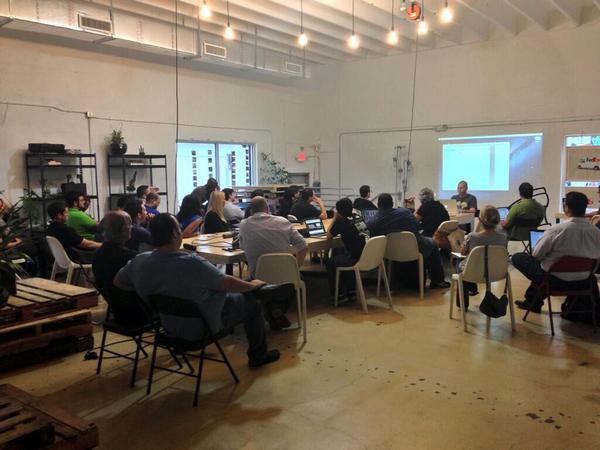
Two tech groups share common goal of building a better Miami
Developer Jake A. Smith leads a joint Code for Miami and Hacks/Hackers meet-up on “Getting Started With Github” at The LAB Miami in August. Photo credit: Rebekah Monson.
Two groups in Miami’s emerging technology scene are working to bring journalists, developers, innovators and residents together to create solutions that benefit the community.
Code for Miami, a Code for America brigade, and Hack/Hackers Miami are inventing new ways to make civic life more functional, coding new programs and promoting access to government data. They even share some of the same members.
Rebekah Monson, a journalist and designer, is an organizer for both groups. Hacks/Hackers, which has chapters all over the world, strives to bridge the gap between journalism (the world of “hacks”) and technology (the world of “hackers”).
By bringing journalists, designers and developers together, Monson said, they hope to learn from one another, develop and innovate new ideas, and change how people see the future of news and information.
“Half the battle in learning something new is meeting people who can help you when you’re stuck, and that’s what Hack/Hackers tries to help. It’s an opportunity for journalists and technologists to make connections, build community and help each other,” said Monson, communications manager at the University of Miami School of Communication.
Code for Miami is working toward improving how local governments and community organizations use the Web by promoting access to government data. For example, the group has developed several apps, such as a TextMyBus app that provides bus arrival times via text messaging.
Both groups meet Monday nights during an “open hack” at The LAB Miami co-working space in Wynwood.
The groups “are totally complementary,” Monson said. Hacks/Hackers Miami “is all about bringing journalists, developers and designers together. The people who are interested in developing civic technology through Code for Miami have a lot of overlap with journalism, already, so it’s easier to get everyone on the same page.”
On a recent Monday, Ernie Hsiung, co-organizer of Hacks/Hackers Miami and a co-captain of Code for Miami, welcomed regulars and newbies alike to a meet-up. Participants introduced themselves and shared their backgrounds. The meeting attracted about 10 people with a range of interests. They included a journalist/media professor from Florida International University; a graduate student from the University of Miami; a local businessman; and even a high school freshman whose mother was trying to encourage his interest in coding and technology.
Hsiung focused on answering questions from Ben, the high school freshman, since he had never attended one of the meet-ups. However, the group spent much of the meeting discussing their projects and how they could make progress, with half of the attendees focusing on their own work and the other half enthusiastically sharing ideas.
“The hope is that, if nothing else, the [groups] helps different folks to meet each other,” Hsiung said, “and to introduce new concepts that may not have been introduced for a variety people: from the idea of developing open-source code, to the idea of developing to help their communities, to the idea of volunteering and being a good citizen.”
Lindsay Brown, communications intern at Knight Foundation
Recent Content
-
Community Impactarticle ·
-
Community Impactarticle ·
-
Community Impactarticle ·


